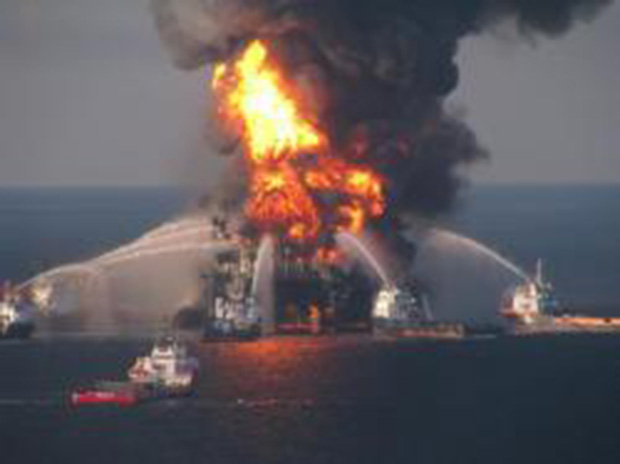
BP has signed a guilty plea agreement with the government, also filed today, admitting to its criminal conduct. As part of its guilty plea, BP has agreed, subject to the Court’s approval, to pay $4 billion in criminal fines and penalties – the largest criminal resolution in United States history.
“The $4 billion in penalties and fines is the single largest criminal resolution in the history of the United States and constitutes a major achievement toward fulfilling a promise that the Justice Department made nearly two years ago to respond to the consequences of this epic environmental disaster and seek justice on behalf of its victims,” said Attorney General Holder. “We specifically structured this resolution to ensure that more than half of the proceeds directly benefit the Gulf Coast region so that residents can continue to recover and rebuild.”
“The explosion of the rig was a disaster that resulted from BP’s culture of privileging profit over prudence,” said Assistant Attorney General Lanny A. Breuer of the Justice Department’s Criminal Division. “We hope that BP’s acknowledgment of its misconduct – through its agreement to plead guilty to 11 counts of felony manslaughter – brings some measure of justice to the family members of the people who died onboard the rig.”
“The oil spill was catastrophic for the environment, but by hiding its severity BP also harmed another constituency – its own shareholders and the investing public who are entitled to transparency, accuracy and completeness of company information, particularly in times of crisis,” said Robert Khuzami, Director of the U.S. Securities and Exchange Commission’s (SEC) Division of Enforcement. “Good corporate citizenship and responsible crisis management means that a company can’t hide critical information simply because it fears the backlash.”
In addition to the resolution of charges against BP, Robert M. Kaluza, 62, of Henderson, Nev., and Donald J. Vidrine, 65, of Lafayette, La. – the highest-ranking BP supervisors onboard the Deepwater Horizon on April 20, 2010 – are alleged to have engaged in negligent and grossly negligent conduct in a 23-count indictment charging violations of the federal involuntary manslaughter and seaman’s manslaughter statutes and the Clean Water Act. David I. Rainey, 58, of Houston – a former BP executive who served as a Deputy Incident Commander and BP’s second-highest ranking representative at Unified Command during the spill response – is charged with obstruction of Congress and making false statements to law enforcement officials. A grand jury in the Eastern District of Louisiana returned the indictments against Kaluza, Vidrine and Rainey, which were unsealed today.
According to court documents, on April 20, 2010, while stationed at the Macondo well site in the Gulf of Mexico, the Deepwater Horizon rig experienced an uncontrolled blowout and related explosions. In agreeing to plead guilty, BP has admitted that the two highest-ranking BP supervisors onboard the Deepwater Horizon, known as BP’s “Well Site Leaders” or “company men,” negligently caused the deaths of 11 men and the resulting oil spill. The information details that, on the evening of April 20, the two supervisors, Kaluza and Vidrine, observed clear indications that the Macondo well was not secure and that oil and gas were flowing into the well. Despite this, BP’s well site leaders chose not to take obvious and appropriate steps to prevent the blowout. As a result of their conduct, control of the Macondo well was lost, resulting in catastrophe.
Kaluza and Vidrine each are charged with 11 felony counts of seaman’s manslaughter, 11 felony counts of involuntary manslaughter and one violation of the Clean Water Act. If convicted, Kaluza and Vidrine each face a maximum potential penalty of 10 years in prison on each seaman’s manslaughter count, up to eight years in prison on each involuntary manslaughter count, and up to a year in prison on the Clean Water Act count.
The information charging BP further details that the company, through senior executive Rainey, obstructed an inquiry by the U.S. Congress into the amount of oil being discharged into the Gulf while the spill was ongoing. As part of its plea agreement, BP has admitted that, through Rainey, it withheld documents and provided false and misleading information in response to the U.S. House of Representatives’ request for flow-rate information. Among other things, BP admitted that Rainey manipulated internal estimates to understate the amount of oil flowing from the well and withheld data that contradicted BP’s public estimate of 5,000 barrels of oil per day. BP has also admitted that, at the same time Rainey was preparing his manipulated estimates, BP’s internal engineering response teams were using sophisticated methods that generated significantly higher estimates. The Flow Rate Technical Group, consisting of government and independent scientists, later concluded that more than 60,000 barrels per day were leaking into the Gulf during the relevant time, contrary to BP’s representations to Congress.
Rainey is charged with one count of obstruction of Congress, and one count of making false statements to law enforcement officials. If convicted, Rainey faces a maximum potential penalty of five years in prison on each count.
The criminal resolution is structured such that more than half of the proceeds will directly benefit the Gulf region. Pursuant to an order presented to the Court, approximately $2.4 billion of the $4.0 billion criminal recovery is dedicated to acquiring, restoring, preserving and conserving – in consultation with appropriate state and other resource managers – the marine and coastal environments, ecosystems and bird and wildlife habitat in the Gulf of Mexico and bordering states harmed by the Deepwater Horizon oil spill. This portion of the criminal recovery will also be directed to significant barrier island restoration and/or river diversion off the coast of Louisiana to further benefit and improve coastal wetlands affected by the oil spill. An additional $350 million will be used to fund improved oil spill prevention and response efforts in the Gulf through research, development, education and training.
In addition to the historic $4 billion in criminal fines and penalties, BP has agreed as part of its guilty plea to retain a process safety and risk management monitor and an independent auditor, who will oversee BP’s process safety, risk management and drilling equipment maintenance with respect to deepwater drilling in the Gulf of Mexico. BP is also required to retain an ethics monitor to improve BP’s code of conduct for the purpose of seeking to ensure BP’s future candor with the United States government.
The United States continues to pursue a civil action to recover civil penalties under the Clean Water Act and hold BP and other defendants liable for natural resource damages under the Oil Pollution Act. A trial on liability matters is scheduled to begin in February 2013, during which the United States will seek to establish that the spill was caused by BP’s gross negligence. BP could face billions of dollars of additional exposure in the civil lawsuit.
The guilty plea agreement and charges announced today are part of the ongoing criminal investigation by the Deepwater Horizon Task Force into matters related to the April 2010 Gulf oil spill. The Deepwater Horizon Task Force, based in New Orleans, is supervised by Assistant Attorney General Breuer and led by Deputy Assistant Attorney General John D. Buretta, who serves as the director of the task force. The task force includes prosecutors from the Criminal Division and Environment and Natural Resources Division of the Department of Justice; the U.S. Attorney’s Office for the Eastern District of Louisiana, as well as other U.S. Attorneys’ Offices; and investigating agents from the FBI, Environmental Protection Agency, Department of Interior, National Oceanic and Atmospheric Administration Office of Law Enforcement, U.S. Coast Guard, U.S. Fish and Wildlife Service and the Louisiana Department of Environmental Quality.
Today, the SEC simultaneously resolved civil securities fraud charges with BP in a $525 million settlement. The Justice Department also acknowledges and expresses its appreciation for the significant assistance provided by the SEC’s Division of Enforcement.
These cases are being prosecuted by Deepwater Horizon Task Force Deputy Directors Derek A. Cohen and Avi Gesser, and task force prosecutors Richard R. Pickens II, Scott M. Cullen, Colin Black, Edward Kang and Rohan Virginkar.
An indictment or information is merely a charge and a defendant is presumed innocent unless and until proven guilty beyond a reasonable doubt.
Report from The Fishing Wire.






